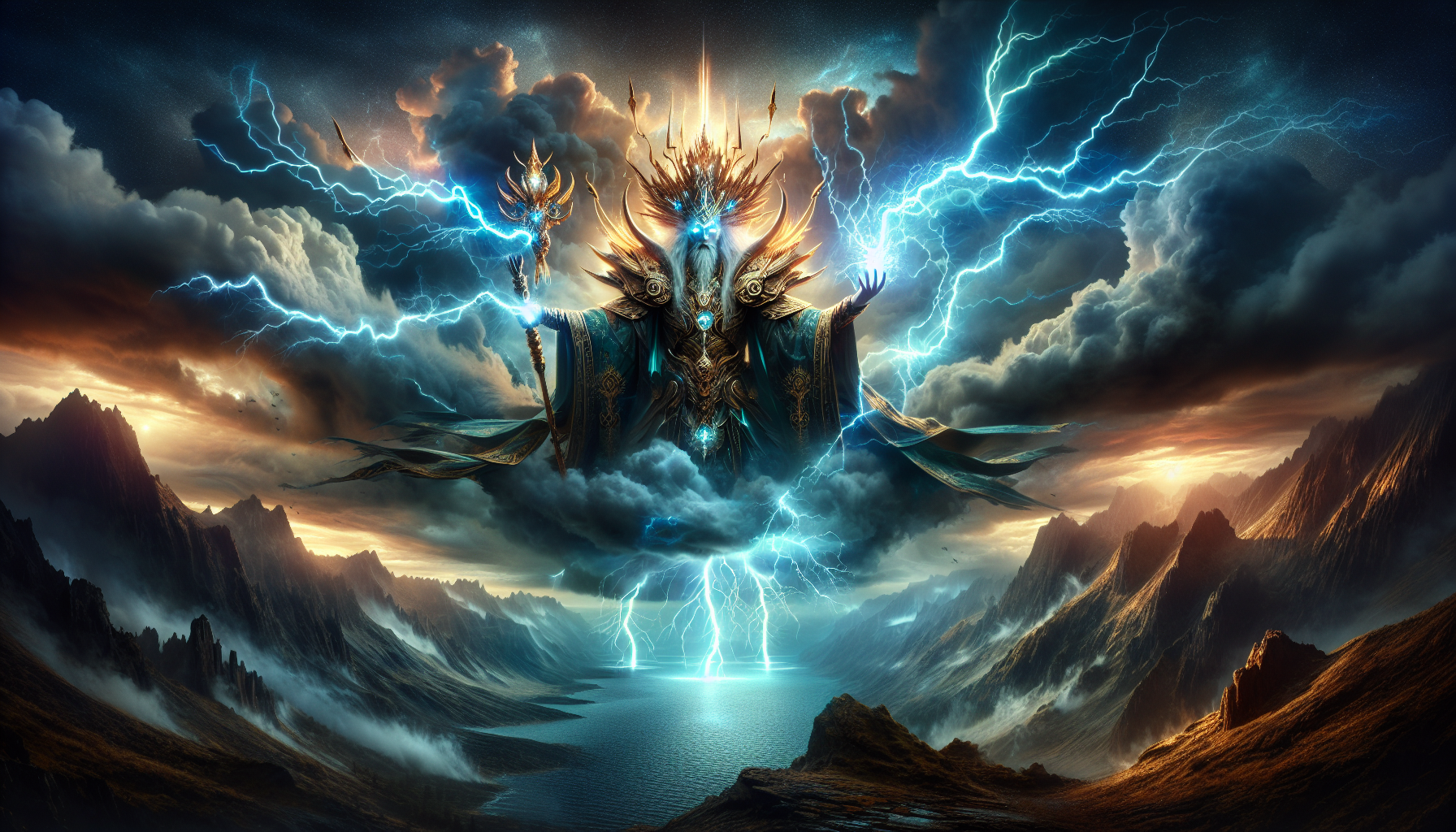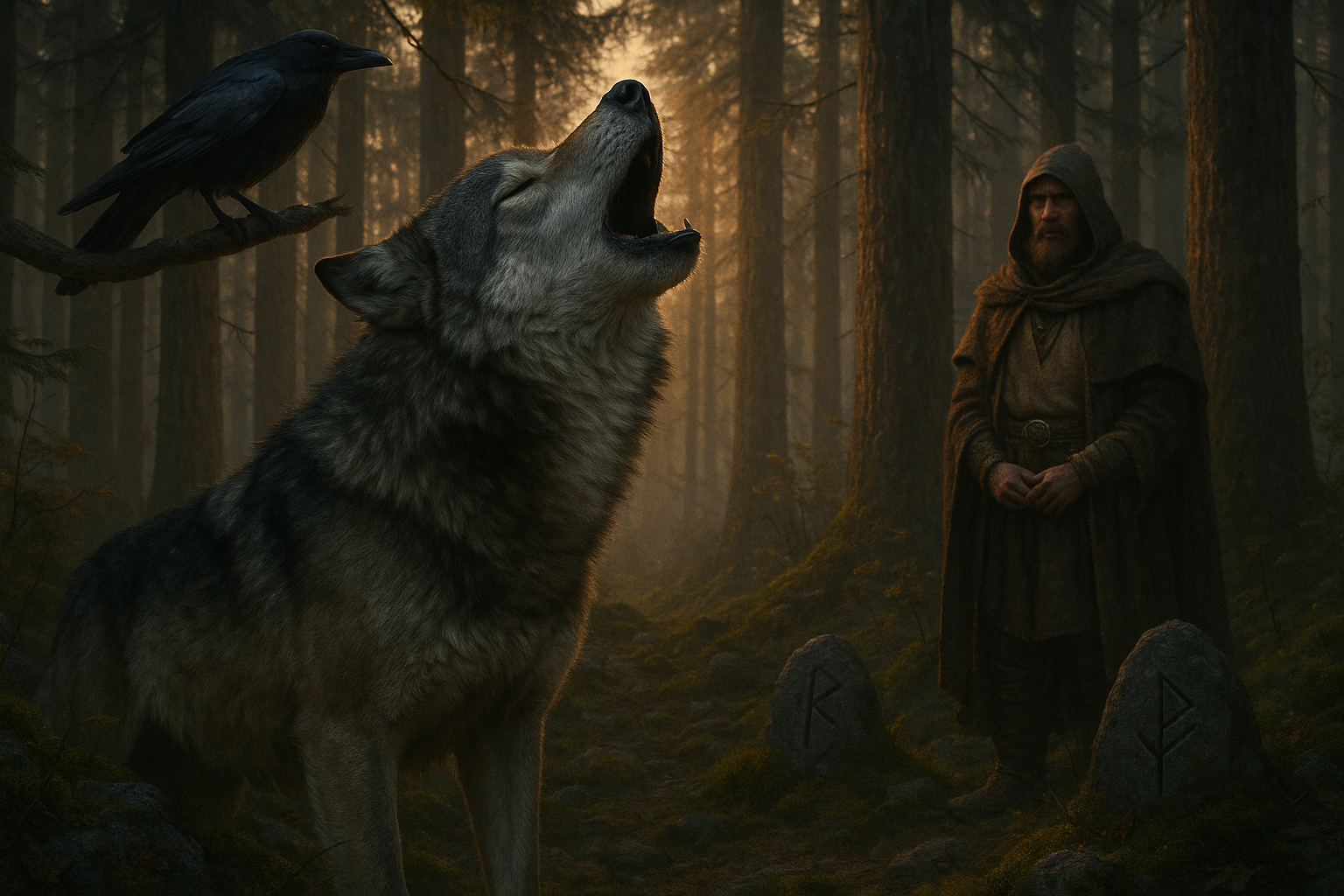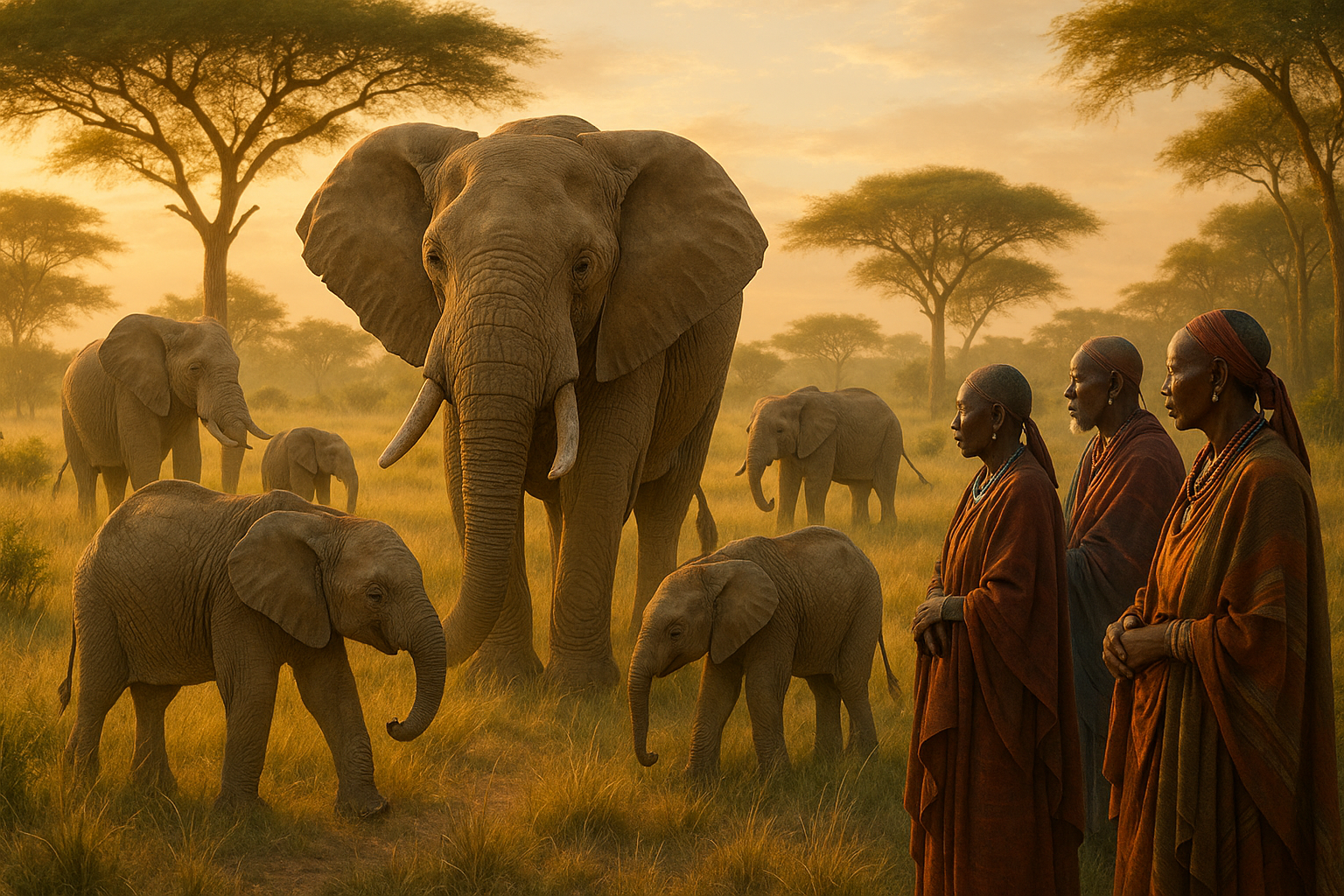In the vast tapestry of human history, few elements have captured our imagination quite like the raw, unbridled power of a thunderstorm. From the heart-stopping crack of lightning to the reverberating boom of thunder, these natural phenomena have inspired awe, fear, and reverence in equal measure. But beyond their meteorological marvel lies a rich tapestry of myth and legend, woven by cultures across the globe. It is in these stories that we find the sky gods, mighty deities who wield lightning bolts as effortlessly as a painter wields a brush. These divine figures, both feared and worshiped, have shaped not only the skies but also the very fabric of human civilization. Join us as we embark on a journey through time and space, exploring the mythical lore of these sky gods and uncovering the truths and tales that have persisted through the ages. ⚡️
Our exploration begins with the mighty Zeus, the king of the Greek pantheon, whose thunderbolts were said to echo across the heavens. From his lofty perch atop Mount Olympus, Zeus ruled with a firm hand, his every decision affecting both gods and mortals alike. But Zeus is not alone in his celestial domain; we will also delve into the stories of Thor, the Norse god of thunder, whose hammer, Mjölnir, could level mountains and whose courage inspired warriors for generations. As we journey eastward, we encounter Indra, the Vedic deity of rain and thunderstorms, whose tales of victory and valor are still sung in the verses of ancient texts. These legends, while unique in their cultural contexts, share common themes of power, justice, and the eternal struggle between chaos and order.
But our journey doesn’t end with the gods of ancient Europe and Asia. We’ll traverse continents to discover the rich narratives of the African god Shango, whose fiery temper and control over storms speak to the deep connection between nature and spirituality in Yoruba mythology. And let us not forget the formidable Tlaloc of the Aztecs, a deity whose control over rain and fertility was vital to the sustenance of his people. Through these stories, we will explore the ways in which the sky gods have influenced art, literature, and society, leaving an indelible mark on our collective consciousness. As we unlock the power of thunder and uncover the mysteries of these celestial beings, we invite you to look beyond the clouds and see the world anew, through the eyes of the divine. ⚡️
The Origin and Significance of Sky Gods
Throughout human history, the vast expanse of the sky has captivated cultures and civilizations, inspiring mythologies and legends centered around deities that govern the heavens. These sky gods often symbolize power, authority, and the mysteries of the cosmos. Their stories are woven into the very fabric of human civilization, influencing religious practices, cultural traditions, and even political structures. In this section, we will delve into the origins of these divine beings, exploring their significance across various cultures and eras.
The concept of sky gods dates back to ancient times, with early civilizations attributing celestial phenomena to the whims and wills of these powerful deities. For example, in ancient Mesopotamia, the god Anu was revered as the supreme deity of the sky, overseeing the universe and its laws. Similarly, in Greek mythology, Zeus reigned as the king of the gods, wielding thunderbolts and commanding respect from both mortals and immortals alike. These figures not only represented the physical aspects of the sky but also embodied the ideals of justice, order, and divine authority.
In addition to their roles as rulers of the heavens, sky gods were often linked to natural events and phenomena. Thunderstorms, lightning, and other atmospheric occurrences were perceived as manifestations of these deities’ powers. This connection between sky gods and natural forces highlights the ancient human desire to explain and control the environment through divine intervention. By understanding the origins and significance of these mythical figures, we can gain insight into the cultural values and beliefs that shaped ancient societies.
Table: Comparative Analysis of Sky Gods Across Cultures
| Civilization | Sky God | Attributes |
|---|---|---|
| Greek | Zeus | Thunder, Lightning, King of Gods |
| Mesopotamian | Anu | Supreme Ruler, Creator of the Universe |
| Norse | Thor | Thunder, Storms, Protection |
| Hindu | Indra | Rain, Thunder, Warrior |
Mythical Narratives and Symbolism
The stories of sky gods are rich with symbolism and moral lessons, offering insights into human nature and the values of the cultures that created them. These narratives often depict the gods as complex characters with both divine and human qualities, reflecting the multifaceted nature of the world and the human experience. By exploring the myths and legends associated with these deities, we can uncover the deeper meanings and teachings embedded within their stories.
One of the most enduring aspects of sky god mythology is the theme of conflict and resolution. In many narratives, sky gods engage in battles with other deities or supernatural beings, symbolizing the eternal struggle between order and chaos. For instance, in Norse mythology, Thor’s battles against giants and other forces of disorder highlight his role as a protector of the cosmos, upholding the balance between creation and destruction. These tales often serve as allegories for the human condition, emphasizing the importance of courage, perseverance, and righteousness in the face of adversity.
Another common motif in sky god mythology is the relationship between the divine and the mortal realms. Many myths explore the interactions between gods and humans, illustrating themes of power, loyalty, and the consequences of defying the divine. In Greek mythology, the story of Zeus and Prometheus underscores the tension between divine authority and human ambition, ultimately conveying the message that hubris and defiance can lead to dire consequences. Through these narratives, ancient cultures sought to impart moral lessons and reinforce societal norms, using the sky gods as both protectors and enforcers of their values.
Video: Explore the Myth of Zeus
For a visual exploration of Zeus and his role in Greek mythology, check out the video below:
Explore the Myth of Zeus – Mythology & Fiction Explained
The Influence of Sky Gods in Modern Culture
The impact of sky gods extends beyond ancient mythologies, leaving a lasting legacy in contemporary culture and thought. These deities continue to inspire artistic expressions, literary works, and even modern religious practices, demonstrating their enduring relevance in human society. In this section, we will examine how the mythological narratives of sky gods have been reinterpreted and adapted in various forms of modern media and culture.
One of the most prominent ways in which sky gods have influenced modern culture is through literature and popular media. Characters inspired by these deities frequently appear in novels, films, and television series, often serving as archetypes for heroism, power, and moral dilemmas. For example, the Marvel Comics character Thor draws heavily from Norse mythology, reimagining the god of thunder as a superhero in the modern world. This adaptation not only highlights the timeless appeal of sky god narratives but also reflects the continued fascination with themes of strength, justice, and cosmic battles.
In addition to their presence in fiction, sky gods have also left their mark on modern religious and spiritual practices. Many contemporary belief systems incorporate elements of sky god mythology, emphasizing the connection between the divine and the natural world. For instance, certain neo-pagan and Wiccan traditions draw inspiration from ancient deities like Zeus and Thor, integrating their attributes and stories into rituals and ceremonies. This revival of sky god worship highlights the enduring spiritual significance of these figures, as well as their ability to adapt and resonate with modern audiences.
Table: Modern Interpretations of Sky Gods in Popular Media
| Medium | Sky God Interpretation | Example |
|---|---|---|
| Comics | Thor as a superhero | Marvel Comics |
| Film | Zeus as a powerful deity | Disney’s “Hercules” |
| Television | Mythical narratives | “American Gods” |
As we continue to explore the mythological lore of sky gods, it becomes clear that these deities hold a significant place in both ancient and modern narratives. Their stories, filled with power, intrigue, and moral lessons, continue to captivate and inspire, offering timeless insights into the human condition and our relationship with the cosmos. Whether through ancient myths or modern adaptations, the legacy of the sky gods endures, reminding us of the enduring power of storytelling and the mysteries of the skies above. 🌌

Conclusion
In conclusion, the exploration of the mythical lore surrounding the sky gods offers a captivating journey through time and culture, illuminating how ancient civilizations sought to explain the formidable and awe-inspiring power of thunder. Throughout this article, we delved into the narratives of diverse cultures, from the Norse god Thor to the Greek deity Zeus, examining how these powerful figures were revered and what they represented to the people who worshiped them.
We began by discussing the universal fascination with the sky and its phenomena, particularly thunder and lightning, which have been sources of wonder and fear across different cultures. This led us to explore the rich tapestry of myths that various civilizations have woven around sky deities, who were often seen as arbiters of justice and wielders of immense power. These narratives not only provided explanations for natural occurrences but also reflected societal values and human psychology.
A significant part of our discussion focused on the Norse god Thor, the hammer-wielding protector of mankind, whose tales of bravery and strength were instrumental in shaping Norse mythology. Thor’s narratives reveal insights into the Norse people’s respect for natural forces and their reliance on divine protection in a harsh world. Similarly, we examined Zeus from Greek mythology, whose rule over the skies and his role in maintaining order among gods and humans alike offered a glimpse into the ancient Greeks’ views on leadership and authority.
Furthermore, we explored the tales of Indra, the Hindu god of thunder, and how his stories illustrate the dynamic interplay between chaos and order. Indra’s mythology underscores the importance of balance and the ever-present potential for renewal and destruction within the natural world.
The exploration of these sky gods is not merely an academic exercise; it offers profound insights into the human condition and our place in the cosmos. These myths, though ancient, continue to resonate with us today, serving as reminders of our ancestors’ quest to understand the universe and their place within it. They challenge us to ponder the mysteries of nature and the divine, encouraging us to seek meaning and inspiration from the world around us.
As we conclude this journey through mythical lore, it’s important to recognize the relevance of these ancient stories in contemporary life. They remind us of the enduring power of storytelling and its ability to convey complex ideas and emotions. In an era where science and technology dominate, these myths invite us to reconnect with the symbolic and the sacred, urging us to find wonder in the everyday and to embrace the unknown with curiosity and courage.
We invite you, dear reader, to reflect on the stories shared here and consider how they might inspire your own journey. Whether you find strength in Thor’s unwavering courage, wisdom in Zeus’s leadership, or balance in Indra’s dynamic role, there is much to learn and apply from these legendary figures. Share your thoughts, engage in discussions, and consider how these ancient tales might influence your perspective on life and the natural world.
If you enjoyed this exploration of sky gods and their myths, we encourage you to share this article with others who might find it intriguing. Engage in conversations about the power of myth and how it shapes our understanding of the world. Let these stories ignite your imagination and inspire you to explore the myths and legends that continue to shape human culture and identity.
For further reading, you may explore resources such as:
1. Norse Mythology – National Geographic’s insights into Norse gods and their enduring legacy.
2. Greek Mythology – Britannica’s comprehensive overview of Zeus and Greek mythology.
3. Hindu Mythology – Britannica’s exploration of Indra and the complexities of Hindu myths.
Thank you for joining us on this enlightening journey. We hope it has enriched your understanding and appreciation of the profound connection between humanity and the divine forces of the sky. 🌩️✨
Toni Santos is a sound storyteller and folklore researcher whose creative path bridges the mystical and the biological through the lens of bioacoustic folklore. With an ear attuned to the voices of nature, Toni explores how ancient cultures interpreted birdsong, forest echoes, and animal calls—not as noise, but as messages, omens, and myths encoded in sound.
Rooted in a passion for both natural science and ancestral lore, his work uncovers the forgotten connections between ecosystems and oral traditions. From the whispered warnings in owl cries to the songs of frogs heralding rain, Toni’s narratives evoke a time when humans listened to nature with reverence and meaning.
Drawing on a background in ecological arts and auditory storytelling, Toni merges field recordings with mythic imagery, turning natural sounds into cultural artifacts of wonder. His stories do more than entertain—they restore a way of hearing the world that blends intuition, memory, and deep listening.
As the creative force behind Vizovex, Toni offers sonic tales, symbolic soundscapes, and research-based reflections that help others rediscover the sacred language of the wild.
His work is a tribute to:
The mythological significance of animal and elemental sounds
Ancient practices of listening for meaning in nature
The spiritual dialogue between humans and soundscapes
Whether you’re a folklorist, an acoustic ecologist, or a curious listener, Toni invites you into a world where the forest speaks, and every chirp, croak, and howl carries a story—one echo, one legend, one call at a time.



